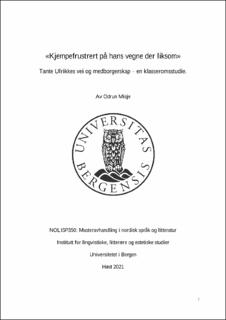«Kjempefrustrert på hans vegne der liksom». Tante Ulrikkes vei og medborgerskap – en klasseromsstudie.
Master thesis
Permanent lenke
https://hdl.handle.net/11250/2834806Utgivelsesdato
2021-11-23Metadata
Vis full innførselSamlinger
- Master theses [274]
Sammendrag
Et overordnet mål for fagfornyelsen 2020 er å styrke skolens demokratiske danningsoppdrag. Under det tverrfaglige temaet demokrati og medborgerskap skal norskfaget bidra til å legge grunnlag for konstruktiv samhandling, men også ruste elevene for deltakelse i demokratiske prosesser. I denne undersøkelsen utforsker jeg derfor hvordan det å delta i litteraturundervisning, der elevene leser og arbeider med skjønnlitteratur, kan bidra til å utvikle forståelse av medborgerskap hos elevene. Jeg har observert en tredjeklasse på studieforberedende linje i deres arbeid med å lese romanen Tante Ulrikkes vei av Zeshan Shakar. Romanen tematiserer utenforskap i samfunnet og gir elevene et innblikk i livssituasjonen til to gutter som strever på flere måter. I etterkant av leseprosessen ble elevene intervjuet i smågrupper. De semistrukturerte intervjuene hadde karakter av å være litterære samtaler, hvor elevene delte leseerfaringer, fortolkninger og oppfatninger av romanen og karakterene. I tillegg deltok elevene i en for- og etterundersøkelse. I teorikapittelet presenteres blant andre Martha Nussbaums teorier om sammenhenger mellom lesing av litteratur og demokratisk medborgerskap. Teoretiske bidrag om medborgersapsbegrepet i nyere tid og formuleringer av ulike medborgerideal, er viktige. Leserorienterte teorier har også informert undersøkelsen. Undersøkelsen viser at elevenes lesemåte, deres engasjement, politiske konklusjoner og opplevd politisk agens, er sentrale faktorer i lesernes forståelse av medborgerskap. Dette gjelder i deres fortolkning av romanen og refleksjoner i etterkant. For å analysere elevenes fortolkninger, er Joel Westheimer og Joseph Kahnes tre medborgeridealer brukt. Disse er 1) Den rettferdighetsorienterte medborger, 2) den deltakende medborger og 3) den personlig ansvarlige medborger. Hovedfunn er at noen lesere møtte karakterene som rettferdighetsorienterte medborgere. De vektla systemsvikt og feilslåtte politiske prioriteringer og derfor mente at løsningene for karakterene var politiske. Andre elever tilla karakterene mer agens, og mente de måtte ta andre valg. Løsningene var dermed individuelle og private. Som følge av ulike fortolkninger, vurderte elevene sine egne medborgerskaplige bidrag til karakterene forskjellig. De fleste elevene uttrykte økt empati og forståelse med karakterene, og for flere ga romanlesingen inspirasjon til å møte sine medmennesker med mer forståelse, toleranse og empati. Dette mente elevene var sentralt for en god medborger og de protesterte eksplisitt mot klassiske forståelser av medborgerskap. En konklusjon av denne undersøkelsen er at lesing av skjønnlitteratur kan bidra til elevenes utvikling som medborgere i samfunnet. An overarching aim of the National Curriculum 2020 is for the school to strengthen its task of democratic edification. The school subject Norwegian should contribute to laying the foundation for constructive interaction, but also for the pupils to be able to participate in democratic processes. In this my thesis I explore how participating in a lesson plan centered on reading and processing literary fiction, can contribute to the development of pupils in upper secondary school's understanding of citizenship. In my research I have observed a class in a Vg3 program for general studies in their work with reading the novel Our street by Zeshan Shakar. The novel explores themes such as exclusion within society and offers a view into the life of two teenage boys who struggle in several ways. I have followed the reading process and conducted interviews in small groups. The semi-structured interviews had the character of a literary conversation, where the pupils shared their reading experience, interpretations and impressions of the novel and its characters. The students also participated in a survey before and after the reading process. The approach to analyze my findings is based partly on the ideas of philosopher Martha Nussbaum concerning possible connections between reading of literature and democratic citizenship. I also interpret responses from the pupils through different understandings of the term citizenship. Contributions on the modern understanding of citizenship are therefore important. Reader oriented theories also inform aspects of the thesis. The research shows that the way the pupils read the novel, affected their engagement, their political conclusions, and their experience of political agency. These are central factors in the readers understanding of citizenship. To analyze the interpretations, I have used Joel Westheimer and Joseph Kahne’s formulations of three conceptions of the “good” citizen. These are 1) justice oriented, 2) participatory, and 3) personally responsible citizen. The pupils emphasized to different extents the effect of circumstance on the characters versus Mo and Jamal`s opportunities to change their direction in life. Justice oriented readers would emphasize the system and public institutions failing Jamal and seek political solutions. Other readers would emphasize that Mo and Jamal have agency, and therefore can change their life directions. The different understanding also influenced what the pupils thought they could do themselves as fellow citizens. For several of the pupils reading of this novel gave them inspiration to approach people they meet with more understanding, tolerance, and empathy - traits they also saw as central characteristics of a good fellow citizen. Several of the students protested classical conceptions of citizenship and emphasized this aspect of being a “good citizen”. Central findings from this research are therefore that reading of literary fiction can contribute to the development of pupils as fellow democratic citizens.
